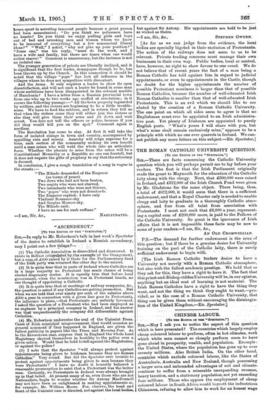[TO TIM EDITOR OA THS " SPROTATOR.1
of the desire to establish in Ireland a Romish ascendency, may I point out a few thiDgs P-
(1) The Catholic Association is-discredited and disavowed. It exists in Belfast (stipliklged brAke example pf the Orangemen), but a sum,of. ..t100 raised by it there for the I'arliamentary,fund of the Irish pirty wig§ letunied the other day to the raisers.
(2) It ih quite true that in parts of Ireland where Catholics aro in a large majority no Protestant has much chance of being elected dispensary doctor. It is equally true that before local government, when the nomination was in Protestant hands, no one thought of appointing a Catholic.
(3) It is quite true that at meetings of railway companies, &c., the question is asked if any Catholics are getting promotion. But when we are told that over ninety per cent of the salaries above .t.200 a year in connection with .a given line goes to Protestants, the inference is plain,—that Protestants are unfairly favoured. I' asked the question of a Protestant who had been employed as an engineer by a principal company in Ireland, and his answer was that -unquestionably the company did differentiate against Catholics., (4) Mr.,Robertson underrates the zeal of the Unionist Press. Cases Of ,Irish municipal misgovernment, that would occasion no general comment if' they happened in England, are given the fullest publicity in papers like the Times and Morning Post. As to the Riverstewn case, suppose that in England the -whole local Magistracy. showed themselves _in hostility to the police over a given action. Would that be held to tell against the Magistrates, or against the police?
(5) I note that the Spectator "will always protest against appointments being given to Irishmen because they are Roman Catholics," Very sounct But did the Spectator ever trouble to protest against appointments being given to men because they were Protestants ? I have no doubt it honestly believed a reasonable presumption to exist that a Protestant was the better man. Certainly, we Protestants in Ireland were always brought up in that belief. At present many of us, even those who are,not Nationalists, begin to wonder whether Sir Antony MacDonnell. may not have been as enlightened in making appointments as, for example, Mr. William Moore. For, observe, the head and front of: the Unionist case is directed, not against the local bodies, —I am, Sir, &c., STEPHEN GWYNN.
[As far as we can judge from the evidence, the local bodies are specially bigoted in their exclusion of Protestants. The action of the railways does not seem to us to be relevant. Private trading concerns must manage their own businesses in their own way. Public bodies, local or central, have, however, no right to show favour to one creed. We do not believe that of recent years the fact of a man being a Roman Catholic has told against him in regard to judicial appointments, or even to appointments in the Castle, though no doubt for the higher appointments the number of possible Protestant nominees is larger than that of possible Roman Catholics, because the number of well-educated Irish Roman Catholics is smaller than that of well-educated Irish Protestants. This is an evil which we should like to see abated by the creation of a Roman Catholic University. The one point on which all sides seem to agree is that no Englishman must ever be appointed to an Irish administra- tive post. Yet plenty of Irishmen are appointed to purely English posts. " What's yours I will share with yon, but what's mine shall remain exclusively mine," appears to be a principle with which no one ever quarrels in Ireland. We can- not publish any more letters on this subject.—ED. Spectator.]










































 Previous page
Previous page